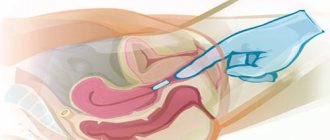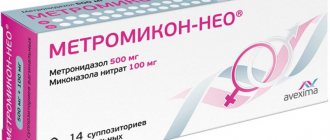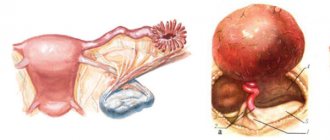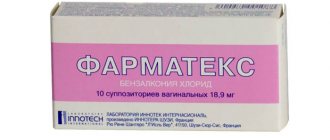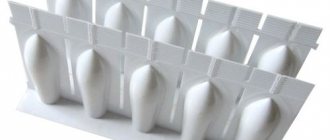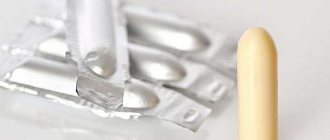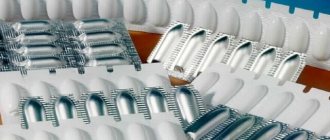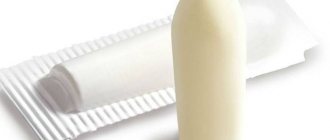Suppositories for ovarian inflammation are most often prescribed by a gynecologist. However, not all patients know the types and purposes of suppositories. Inflammation of the ovaries (oophoritis) and appendages (salpingoophoritis) is caused by bacteria, viruses or fungi. The treatment method is complex and includes getting rid of the source of infection, relieving inflammation, relieving pain, restoring flora, and preventing the occurrence of adhesions.
Suppositories play an important role in treatment for inflammation of the ovaries.
General information
Anti-inflammatory drugs in the form of suppositories are prescribed for various diseases of the female reproductive system.
Some gynecological suppositories are used vaginally, others rectally. But in general, the list of gynecological suppositories is very wide. Anti-inflammatory drugs in gynecology are always prescribed if an inflammatory process is noted. They are widely used, but at the same time, like other medications, vaginal and rectal suppositories have certain disadvantages.
Indications
Suppositories are used to treat the following diseases:
- cervical erosion,
- vaginitis,
- vaginal candidiasis (thrush),
- adnexitis,
- endometritis,
- urethritis,
- vulvitis,
- cystitis,
- cervicitis (inflammation of the cervix),
- oophoritis.
Also, suppositories can be prescribed as a prophylactic agent before and after operations on the female genital organs, before and after childbirth, and after abortions.
Vaginal suppositories are contraindicated in cases of intolerance to their components, the presence of cysts, erosions and cracks in the vagina.
Rectal suppositories should not be used for exacerbations of hemorrhoids, inflammatory processes in the intestines, fissures in the anus, or intestinal bleeding.
Also, before using each drug in the form of a suppository, you must read the instructions. Some substances contained in suppositories may be contraindicated in diseases of the liver, kidneys and other organs, during pregnancy and breastfeeding.
Most medications should not be used during menstruation, although there are medications that can be used during menstruation.
Not all suppositories are indicated during pregnancy. This point must also be taken into account when choosing them.
The drug is prohibited for use by children under 12 years of age. It can have negative effects on children. You should also not use the medicine if:
- renal failure;
- risk of pulmonary hemorrhage.
If there is a risk of these phenomena, you should consult your doctor about the need to use the medicine.
It is strictly forbidden to use the medication for the following problems:
- individual intolerance to the drug;
- oncological processes in the body;
- pregnancy;
- lactation.
If necessary, you can find analogues of the medication without the listed prohibitions.
Suppositories as a dosage form
Suppositories are one of the best medicines that can effectively cure women's diseases. Suppositories are used for the prevention of female diseases, as well as for their treatment. The composition includes a base, which gives the product the shape of a candle, as well as a medicinal substance. The main feature of this medicine is that its form is stored at room temperature, and turns into liquid form when body temperature is noted.
Anti-inflammatory vaginal suppositories are prescribed for a variety of diseases of the female reproductive system. Vaginal suppositories are also used to prevent such diseases. In particular, vaginal suppositories are prescribed for inflammation of the ovaries , antiviral suppositories for women, etc.
Despite the fact that the list of vaginal suppositories is very large, their names are known to many, and in pharmacies most of these drugs are sold without a prescription, the doctor should tell you individually which antibacterial or antiviral drugs should be used.
It is very important to know how to properly administer suppositories. How to use this form of medication is indicated in the instructions. But how to place suppositories may vary depending on the drug. For example, some suppositories are recommended to be used before bedtime, once a day.
To insert candles correctly, you need to take a lying position and wash your hands first. Also, before administering the medicine, you need to prepare a sanitary pad.
All candles are usually divided into different types depending on where they are administered:
| Rectal | They are inserted into the rectum through the anus, they are produced in the shape of a cone, cigar, or sharp cylinder. How to insert suppositories into the rectum is described in the instructions. It is better to place suppositories in the rectum after bowel movements. |
| Vaginal | Vaginal suppositories, which are produced in a cone-shaped or egg-shaped form, as well as in the form of balls |
| Sticks | They are inserted into the ureter, cervix, etc. |
The main advantage of using this form of medication is that the active substance enters the bloodstream relatively quickly (about half after half an hour, 100% after an hour). At the same time, it does not enter the gastrointestinal tract and is not destroyed in the liver. Also, vaginal suppositories have not only a general, but also a local effect.
In addition, the application process is very simple and painless; suppositories very rarely cause allergic reactions.
Benefit
All suppositories have a similar composition. They are made from a base - fats such as glycerin, paraffin or gelatin, adding an active substance to this mass. In the refrigerator or at temperatures up to +30ºС, gynecological suppositories remain hard due to inflammation. As soon as they enter the vagina, where the temperature can reach +37ºС, or even higher, the melting process begins. As a result, the active substance is released.
Suppositories have only a local effect. The active substance almost does not enter the general bloodstream and does not burden the body’s cleansing systems - the liver and kidneys. The mucous membranes of the vagina and rectum are lined from the inside with a fine capillary network, through which the active substance penetrates into the blood. As a result, it circulates in the blood vessels supplying the pelvic organs. Thanks to this, the desired therapeutic effect will be provided.
Suppositories for infections in gynecology have a significant advantage over drugs used orally. And all because they do not pass through the gastrointestinal tract, therefore side effects from the digestive system are excluded.
Candles for colpitis
colpitis is in gynecology need to know, that this is a disease in which an inflammatory process occurs in the vaginal mucosa. Treatment of colpitis in women depends on which infectious agent provoked the inflammation. Thus, colpitis (vaginitis) can be either specific ( fungal , trichomonas , gonorrheal , etc.) or nonspecific ( streptococcal , staphylococcal , polymicrobial ). It is depending on the type of infection that drugs for the treatment of colpitis are selected, in particular, suppositories for colpitis .
The main signs of vaginitis are discomfort in the external genital area, a feeling of severe itching and burning. The amount of discharge with an unpleasant odor increases, the temperature may rise, pain in the lower abdomen occurs, and problems with urination appear.
In this situation, it is important to use correctly selected suppositories for vaginitis, which help not only get rid of symptoms, but also completely cure vaginitis, suppressing the activity of pathogenic microorganisms.
In the first days of the illness, douching should be done using antiseptics ( Rivanol , Potassium permanganate , Chlorhexidine , Sodium bicarbonate ). Herbs are also used for this purpose - douching with chamomile, sage, lemon balm,
In parallel with douching, you can insert suppositories into the vagina. The doctor selects suppositories that demonstrate activity against the type of pathological microflora that provoked the disease. Therefore, before prescribing treatment, the gynecologist conducts a study to determine which medications should be taken.
Nonspecific vaginitis
If a patient is diagnosed with nonspecific colpitis , she is prescribed broad-spectrum antibacterial vaginal suppositories or antiseptics.
The following suppositories can be prescribed to cure the inflammatory process in gynecology.
Polygynax
Polygynax contains nystatin, neomycin, polymyxin B. Polygynax is prescribed twice a day and should be used for 1-2 weeks.
Cost – from 320 rubles. for 6 pcs.
Terzhinan
The composition includes neomycin, ternidazole, prednisolone, nystatin. Terzhinan candles need to be placed once, in the evening, for 10 days.
Price – from 370 rub.
Meratin-Combi
Meratin contains neomycin, nystatin, prednisolone, ornidazole. You need to enter 1 sup. in the evening for 10 days.
The cost of Meratin-Combi is from 350 rubles.
Mikozhinaks
The composition includes nystatin, chloramphenicol, dexamethasone, metronidazole. Mikozhinax should be administered for 1-2 weeks, 1-2 supp. are used per day.
Hexicon
The composition includes the active component chlorhexidine bigluconate. Hexicon is administered 1 supp., treatment lasts up to 10 days.
Price – from 290 rub.
Betadine
The composition includes iodine, Betadine should be used twice a day, the duration of treatment is up to 12 days.
Price – from 280 rub.
Depanthol
The composition of the combined product Depantol includes chlorhexidine bigluconate and dexpanthenol. It has an antimicrobial, anti-inflammatory, reparative effect. Enter 1 sup. 2 times a day for up to 10 days.
Price – from 270 rub.
Sometimes the drug Depantol is confused with Depanthenol . It should be noted that Depanthenol is an ointment that is used to treat skin lesions.
Vaginal products
Anti-inflammatory suppositories used in gynecology for diseases of the appendages must be used in strict accordance with doctor's prescriptions. If the doctor has not given any special instructions, you should carefully read the instructions for the drug.
Most often, gynecologists prescribe such suppositories for inflammation of the appendages:
- Terzhinan. The components of the drug are antimicrobial substances that destroy pathogenic microflora, and corticosteroids that have a powerful anti-inflammatory effect. Thanks to this combination, Terzhinan cures any inflammatory disease of the ovaries in 10 days. The medicine is aggressive against pyogenic microflora and fungi. Also, the active principle of the drug effectively fights various mixed infections. A peculiarity of the use of these suppositories is that they require preliminary wetting before administration;
- Hexicon suppositories are prescribed for pathologies of the internal reproductive system of women, which are caused by various gram-positive and gram-negative bacteria. In addition to the treatment of diseases, Hexicon is effectively used to prevent the development of complications before childbirth, as well as before major and minor operations on the pelvic organs. This drug is also successfully used to prevent infections that occur through sexual contact. In this case, the suppository must be inserted into the vagina in the first two hours after unprotected intimate relations;
- To effectively treat general inflammation of the appendages, called adnexitis, Betadine vaginal suppositories are inserted into the vagina.
This remedy is equally effective for diseases caused by fungal, bacterial and viral infections. The drug should not be taken for pathologies of the thyroid gland, since the product contains active iodine, which enhances the production of hormones.
Gardnerellosis
If a woman’s smear shows gardnerella , then she is prescribed suppositories containing metronidazole .
Ginalgin
Manufacturer: Ukraine. Ginalgin contains tinidazole, vitamin C, sinestrol, and lactic acid. You need to use 1 supp. before bed for 10 days.
Klion-D
Klion-D contains miconazole and metronidazole. Apply twice a day for 10 days. Price – from 390 rub.
- Therapy is also carried out with the drugs Mikozhinax , Meratin-Combi - they are prescribed twice a day for 12 days.
- The drugs Flagyl , Metronidazole , Trichopolum are prescribed twice a day for 10 days.
Reviews
Elena, 32 years old: “A year ago I was diagnosed with endometritis. I used Longidaza suppositories once every three days for 2 months. Inserted vaginally. The ultrasound specialist noticed the effect within a month, and after two months the inflammatory process practically stopped. Three months later I took a second course, after which I was completely cured. I recommend this drug to anyone who wants to quickly get rid of reproductive system problems.”
Anastasia, 23 years old: “I was prescribed suppositories after uterine surgery. There was a high likelihood of negative scarring. I took three courses of 30 days each with a break of 2.5 months. At first, the effect was difficult to notice: healing had just begun. The drug often made me feel dizzy. But by the third round it was already noticeable that the recovery had gone as it should.
Colpitis caused by Trichomonas
If trichomonas are detected in the vaginal contents, the patient is prescribed suppositories containing metronidazole, which has an antimicrobial effect and is effective in the fight against trichomonas. These are the drugs Flagyl , Metrovagin , etc. Metrovagin , Flagyl should be used 1 supp. before bedtime.
Metronidazole derivatives are also prescribed - Trichopolum , Klion D , Pitrid , Ginalgin , Flagyl , which are given 1 per day for 10 days. Other candles are also widely used:
- Gaynomax ( Tinidazole ). Gainomax suppositories are used for 10 days.
- Macmiror - contains nystatin and nifuratel, used for candidiasis, chlamydia, trichomoniasis , nonspecific vaginitis. Course of application – 8 days.
- Terzhinan , Mikozhinaks , Meratin-Combi - 1 pc. every day. within 10 days.
- Trichomonacid , Trichocid are also prescribed for 10 days.
- Neo-Penotran , containing metronidazole and miconazole, is used 2 times a day for two weeks.
- Hexicon – 3 times a day, Hexicon should be used for 1-3 weeks.
- Tinidazole is an analogue of the drug Hexicon. Tinidazole is used in the same way.
- Eucalymin - according to the regimen prescribed by the doctor.
It should be noted that for trichomonas colpitis, therapy with anti-inflammatory suppositories is carried out for three months, in cycles of 10 days. Start of use - immediately after menstruation.
A gynecologist will explain which female suppositories to use for inflammation and which is better.
Genital herpes
Antiviral suppositories and other forms of medications are used to treat genital herpes
- The treatment regimen includes local drugs that contain A-interferon - they need to be used in 1-2 pcs. for one week.
- Genferon and Viferon are also prescribed in the form of suppositories. Viferon is used 2 times a day for 7 days. Viferon suppositories are also effective for colds: if a woman has a cold, the doctor sometimes prescribes them as part of complex therapy.
- In addition to suppositories, ointments are used to treat the vulva and for tampons: Epigen , Acyclovir , Bonafton , Megosin , Alpizarin .
Candidiasis colpitis
For the treatment of candidal colpitis, broad-spectrum antifungal gynecological suppositories are prescribed. These are drugs that include clotrimazole , natamycin , canesten , nystatin . These suppositories are widely used to treat thrush . You should also pay attention to the list of other suppositories used for candidiasis - Fluomizin (Fizomizin is a misnomer), etc. Antifungal ointments are also prescribed: Miconazole , Pimafukort ; tablets: Pimafucin , Flucostat , Oronazole .
After the first stage of treatment has completed and the activity of the fungi has been suppressed, a second stage of therapy must be carried out to restore normal vaginal flora. It is important that normal conditions are created for active reproduction of lactobacilli to occur.
During this period, the woman is prescribed:
- Bifidumbacterin suppositories containing bifidobacteria . The drug is intended to normalize microflora. Bifidumbacterin is used for up to 10 days, 1 supp. in a day.
- Bifikol (with dried bifidobacteria) should be used every day, 1 supp. within up to 10 days.
- Acylact is used for 10 days, 1 supp. Acylact for the night. Vagilak suppositories are also prescribed .
- The drug Laktozhinal contains lactobacilli, 1 capsule is administered into the vagina. morning and evening, treatment lasts up to 10 days.
- Also during the treatment process you can use Colibacterin , Bifikol , Bifidumbacterin in ampoules. The contents of the ampoules must be diluted with water and tampons with this liquid should be inserted intravaginally.
General contraindications and side effects
Suppositories used for ovarian inflammation in women are generally tolerated by patients without side effects. However, sometimes there may be discomfort in the vagina. Such side effects include:
- itching or burning sensation on the vulva or in the vagina itself. This phenomenon may be caused by individual intolerance to the active principle of the medication or formative component;
- an increase in the amount of discharge or a change in its appearance or smell. This effect may indicate both the positive dynamics of therapy and idiosyncrasy to the drug. To find out the reason for such changes, you should consult your doctor;
- redness and swelling of the mucous membranes indicate intolerance to the therapy. In such cases, a change in treatment tactics is required;
- anti-inflammatory gynecological suppositories used for diseases of the appendages can cause an allergic reaction from the whole body. This manifests itself in the appearance of various rashes on the body, general swelling, the development of conjunctivitis of allergic etiology or hay fever;
In more severe cases, contact eczema may begin to develop.
In all cases of changes in the general condition of the body during treatment or the appearance of changes in the reproductive system, it is imperative to notify the attending physician. The doctor will determine the cause of the unwanted effects and make the necessary adjustments to the therapy.
Despite all the ease of use and high efficiency, it is not always possible to use suppositories against inflammation of the appendages. There are cases in which this type of therapy should not be used. First of all, this applies to cases of increased hypersensitive reaction of the body. In this case, the high readiness of the woman's immune system can lead to a powerful allergic reaction of an immediate type, requiring emergency care.
Anti-inflammatory suppositories in gynecology
Currently, the list of names of drugs with anti-inflammatory effects is very large. Such drugs are used to treat inflammation, as additional means in a treatment regimen, which also includes tablets, injections, herbs, etc. All names of suppositories for inflammation that are offered in pharmacies must be reported to the doctor so that he can prescribe the most effective treatment.
antibiotics are also included in a comprehensive treatment regimen . Antibacterial drugs effectively complement local medications in the form of suppositories.
Ichthyol suppositories in gynecology
Despite the simplicity of this natural-based drug, reviews of ichthyol suppositories in gynecology are almost always positive, as it works effectively. The active substance is ichthyol.
These analgesic suppositories are used if treatment of inflammatory diseases is necessary, as well as to accelerate the healing of injuries and ulcers of the mucous membrane. Medicines containing ichthyol are suitable for both women and men (rectally).
If necessary, they are also used in veterinary medicine - for the treatment of dogs.
Methyluracil suppositories in gynecology
They are used to treat a variety of gynecological diseases. They accelerate epithelial renewal, heal damaged skin, and stimulate metabolic processes. They produce an anti-inflammatory effect and are used as an additional remedy in the treatment of cervical erosion.
Sea buckthorn suppositories in gynecology
Sea buckthorn suppositories are widely used in gynecology.
They are advisable to use in the treatment of cervical erosion , mucosal injuries , and dysbacteriosis . Reviews indicate that suppositories with sea buckthorn are very effective in gynecology. Moreover, they can be used at any age - old age or too young age is not a contraindication. Treatment with this drug during pregnancy is also allowed.
Candles with calendula
When choosing antimicrobial drugs, you should not forget about suppositories with calendula . After all, calendula has an antimicrobial, anti-inflammatory, and wound-healing effect. The instructions indicate that this dosage form rarely causes side effects.
Vaginal suppositories are used to treat inflammatory processes, atrophic colpitis, and cervical erosion.
Indomethacin suppositories in gynecology
This medicine, by blocking the synthesis of prostaglandins, relieves pain, reduces temperature, and relieves inflammation. They are prescribed for endometriosis , inflammation of the ovaries, and uterine fibroids with pain.
Indomethacin suppositories also effective in reducing the formation of adhesions.
Candles Betiol
Betiol suppositories , which contain belladonna and ichthammol, are used as an antiseptic. They are used rectally for hemorrhoids . But sometimes during pregnancy planning, the doctor prescribes suppositories, which include belladonna, in order to influence the basal temperature.
Syntomycin suppositories
Syntomycin is used if the pelvic organs are affected by staphylococci, chlamydia, streptococci and other bacteria.
They are prescribed for cervicitis , vaginitis , etc. Syntomycin has virtually no systemic effect on the body. Sintomycin is administered intravaginally twice a day. How long to use the drug is determined by the doctor, but, as a rule, treatment lasts up to 10 days.
Candles Kyzyl-May
The composition includes herbs, sea buckthorn oil, cocoa butter, bentonite, beeswax. Kyzyl-Mai suppositories improve tissue regeneration and have an anti-inflammatory effect.
Prescribed for colpitis , cervitis , erosions . You need to apply 1-2 supp rectally. per day, treatment lasts up to 15 days. Cost – from 600 rubles.
Suppositories for adnexitis, endometriosis
The instructions for many drugs in the form of suppositories indicate the names of female gynecological diseases. After all, antibiotics for gynecological diseases in the form of tablets, as well as injections, must be supplemented with local agents.
Treatment of adnexitis should be carried out according to the regimen prescribed by the specialist. It is important that antibiotics for adnexitis are selected correctly. After all, inflammatory diseases of the reproductive system can be provoked by specific ( chlamydia , gonorrhea , trichomoniasis ) and nonspecific microorganisms.
- Adnexitis is an inflammation of the appendages, in which a woman feels pain in the groin area. The pain can be cutting, dull, aching.
- Endometritis is an inflammatory process of the uterus, in which pain of a different nature is noted in the lower abdomen. Most often, this disease develops after intrauterine interventions ( curettage , abortion , surgical birth).
Both with adnexitis and endometritis a woman’s body temperature may rise, and other signs of intoxication are noted.
For endometriosis , medications are often used to restore immune status. How to treat endometriosis - with medications or other methods - the doctor determines after examination and establishing an accurate diagnosis. Treatment of endometriosis involves the use of the drug Viferon with interferon and vitamin E and C. For pain relief, rectal suppositories are used - NSAIDs .
To resolve adhesions, the drug Longidaza . Terrylitin suppositories and others are prescribed to reduce inflammatory processes. It is also sometimes advisable to take tablets - Curantil , etc.
Treatment of inflammation of the uterus and appendages involves, first of all, antibiotics; suppositories are also used for inflammation of the female organs. The use of suppositories is practiced for different purposes.
Rectal suppositories for inflammation of the appendages with an anti-inflammatory effect usually contain NSAIDs. They provide anti-inflammatory, antipyretic and analgesic effects. Medicines that belong to the group of NSAIDs suppress the synthesis of prostaglandins, which are formed in large quantities during inflammatory processes and provoke pain.
The use of rectal suppositories begins at the same time as the patient begins taking antibiotics. Treatment lasts from 7 to 10 days. As a rule, Indomethacin , Movalis , Voltaren , Diclofenac , Diclovit , Flamax , etc. are prescribed.
- Indomethacin is prescribed once and should be used in the evening.
- Movalis (active component meloxicam ) is used once before bedtime for 7 days.
- Voltaren is used in the evening and in the morning.
- Diclofenac , Diclovit - once a day.
- Belladonna candles – 1-3 times a day.
- Flexen , Flamax (active component ketoprofen) are used once, 7 days. The name "Alamaks" is also found. However, the correct name for the candles is not Alamax, but Flamax.
Modern gynecology offers a fairly wide list of rectal anti-inflammatory suppositories, but any painkillers and anti-inflammatory suppositories should be prescribed by a doctor as part of the general treatment regimen. If additional painkillers in tablets are needed, this should also be selected by a specialist.
Also, anti-inflammatory suppositories for women with endometritis and adnexitis are prescribed intravaginally. Like anti-inflammatory rectal suppositories, they need to be used regularly. The purpose of using such drugs is to sanitize the vagina and suppress anaerobic flora.
Terzhinan and Fluomizin (the active component metronidazole) are prescribed for such diseases You need to use Terzhinan and Fluomizin for up to 10 days, 1-2 supp. every day.
When the main therapy with anti-inflammatory drugs is completed, it is very important to normalize the vaginal biocenosis. For this purpose, they use both those drugs that contain bifidobacteria and lactobacilli, as well as Longidaza suppositories.
Longidaza provides a proteolytic effect. These are effective preventive suppositories, as they prevent the appearance of adhesions and also resolve existing ones. Longidaza stabilizes the function of the immune system and also provides antioxidant and anti-inflammatory effects. This drug is also prescribed for ovarian cysts. The suppositories should be used rectally, before bedtime. The course of therapy lasts up to 3 weeks.
Suppositories for cervical erosion
Cervical erosion is a very common disease among women. It develops if the stratified squamous epithelium in the vaginal part of the cervix is desquamated. In its place, columnar epithelial cells that line the cervical canal multiply. Cervical ectopia is a more correct name for this disease.
Those who are looking for the names of suppositories for cervical erosion should note that the treatment of this disease is carried out as follows: the pathological area is destroyed by electrical, chemical, and laser methods. Before and after cauterization, suppositories are prescribed to treat cervical erosion. Before cauterization with laser, radio waves or other methods, anti-inflammatory suppositories should be placed 5-7 days before the procedure to prevent inflammation of the cervix after surgery. As a rule, suppositories are prescribed : Polygynax , Hexicon , Livarol , Suporon , as well as other drugs.
4-5 days after cauterization, you need to use healing suppositories, which have a stimulating and antioxidant effect on the body as a whole, improving health, as well as on the area that was subject to manipulation. In the period after surgery buckthorn suppositories for cervical erosion, as well as Galavit , Galenophyllipt , Suporon , Depantol , Evkolek , Fitor suppositories . Belladonna suppositories are sometimes prescribed . Revitax suppositories are phytosuppositories that also contain hyaluronic acid . They effectively relieve inflammation and promote healing.
You can purchase both expensive drugs and their cheaper analogues. Candles with reparative properties are used in 1 pc. for 10-14 days.
If necessary, tablets and other medications are also prescribed.
For cystitis
Women suffering from cystitis use different medications in this form. Almost every thematic forum informs about this, where women often describe the means they use. However, any medicines for cystitis should be taken after they have been prescribed by medical specialists, despite the fact that they can often be bought in pharmacies without a prescription. Suppositories are prescribed as an aid in treatment. As a rule, the doctor prescribes broad-spectrum antibiotics, which are used for infectious diseases.
Most often, for cystitis, suppositories are prescribed : Hexicon (contains chlorhexidine, which is an antiseptic), Betadine , Genferon , Macmiror , Synthomycin suppositories , Palin suppositories , etc.
Composition of Longidaz suppositories and injections
Longidaza suppositories - suppositories against infertility, are not the only form of release of the drug. Ampoules for intravenous administration are also produced. However, in gynecology, the practice of using suppositories is more common - they have a targeted effect and actively affect the site of the disease.
The suppository contains:
- Excipients;
- hyaluronidase.
Hyaluronidase, which is included in Longidase suppositories for infertility, is a substance related to hyaluronic acid. It activates the process of disintegration of adhesions and easily removes the film, restores the softness of the fallopian tubes, and stimulates natural regeneration functions.
The excipient helps to gently introduce the drug into the affected area and increases the absorption of the active compound.
Suppositories can be prescribed in urology for the treatment of chronic prostatitis. They are especially often prescribed for congestive lesions of the prostate gland. Hyaluronidase heals damaged tissues and reduces inflammation. The main advantage that the drug has is that it improves blood circulation in the gland area, which helps get rid of swelling, pain, and inflammation.
The use of Longidase for chronic prostatitis is safe for men, does not lead to damage to healthy tissue, and helps to get rid of infertility. It is recommended to use rectal suppositories instead of injections.
